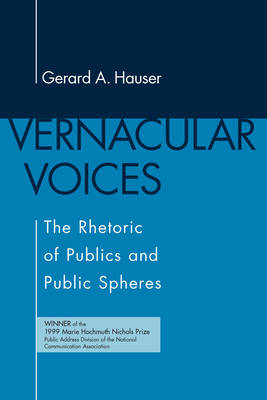
- Afhalen na 1 uur in een winkel met voorraad
- Gratis thuislevering in België vanaf € 30
- Ruim aanbod met 7 miljoen producten
- Afhalen na 1 uur in een winkel met voorraad
- Gratis thuislevering in België vanaf € 30
- Ruim aanbod met 7 miljoen producten
Omschrijving
Democracy is grounded on the principle that public opinion should influence the course of society. Yet this opinoin, its content, and its representation are difficult to define and interpret. Vernacular Voices: The Rhetoric of Publics and Public Spheres discusses the role of citizen voices in steering a democracy through an examination of the rhetoric of publics--active segments of society that influence the general climate of public dialogue--and of the associated public spheres and public opinion.
Prevailing thought about publics and public spheres tends to emphasize the official discourse that comes from official or powerful voices while it neglects mundane, everyday exchanges. In this volume Gerard A. Hauser maintains that the interaction between everyday and official discourse discloses how active members of a complex society discover and clarify their shared interests and engage in exchanges that shape their opinions on issues of common interest. Paying close attention to how active members of society engage in public dialogue reveals a picture of citizens who are engaged and contentious on matters that affect their lives. This book sets forth a conceptual framework, called publics theory, for understanding how the rhetorical character of formal and informal communication bears on the spheres in which publics form and the quality of the opinions they express. Hauser extends his discussion of these theoretical concerns through four case studies that investigate the rhetorical formation of publics, public spheres, and public opinion. The case studies illustrate the effect of social dialogue on public problems and enable a better understanding of how actual publics, public spheres, and expressions of public opinion influence the development of complex social events.
The first of the studies, which explores the role of cultural memory and narrative in shaping the recent political transformations in Central Europe, contrasts events in Poland and the former Yugoslavia. The other studies explore attempts to redefine the character of the public sphere by the so-called Meese Commission Report, the Carter administration's technological understanding of public opinion during the Iranian hostage situation of 1979-80, and the dialgoue of the American people with Franklin D. Roosevelt on the meaning of America as expressed in their letters encouraging him to stand for a third term in office.
Specificaties
Betrokkenen
- Auteur(s):
- Uitgeverij:
Inhoud
- Aantal bladzijden:
- 362
- Taal:
- Engels
- Reeks:
Eigenschappen
- Productcode (EAN):
- 9781570037887
- Verschijningsdatum:
- 31/07/2008
- Uitvoering:
- Paperback
- Formaat:
- Trade paperback (VS)
- Afmetingen:
- 152 mm x 229 mm
- Gewicht:
- 521 g

Alleen bij Standaard Boekhandel
Beoordelingen
We publiceren alleen reviews die voldoen aan de voorwaarden voor reviews. Bekijk onze voorwaarden voor reviews.











